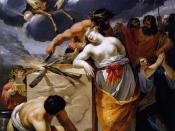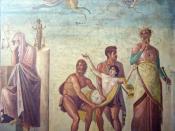The gods do not affect the fates of the characters in Iphigenia. The gods do serve other purposes though. For instance, the gods are used by all the high ranking characters to control the army. Calchas uses that to control Agamemnon. Finally, the play-write, who wrote the play when the whole idea of the gods was starting to be questioned; he is trying to show what happens when people blindly follow religion.
Agamemnon, Calchas, and the other characters who hold power over the people all question the existence of the gods. When the winds don't come for many days, and the army is restless, Agamemnon sends Calchas to the oracle to find out what the gods want him to do to get wind. Agamemnon probably expected that he would have to do something small in order to please the gods. Keep in mind that Agamemnon doesn't really believe in the gods, but his army does, so what he is really doing is pleasing the army.
However, when Calchas returns, Agamemnon finds out he must sacrifice his own daughter. He lies to his daughter to get her to come to him. Agamemnon knows that he really doesn't have to please the gods, the winds will come anyway. So, Agamemnon tries to buy himself a little time. Needless to say, Agamemnon's calculation of just how much time he needs is a little short. When Iphigenia arrives, the winds have still not picked up enough for the ships yet, but they are starting to pick up a little bit. As Iphigenia slowly walks to be sacrificed, the winds begin to pick up heavily. To the army, who believes in the gods, this means that this sacrifice is already starting to please the gods, so they will not back out of it...


